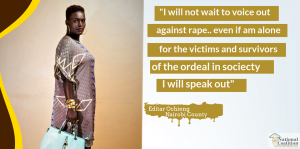
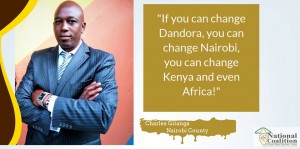
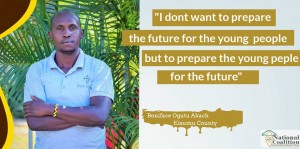
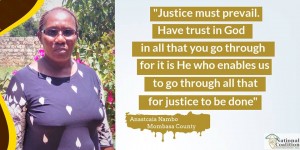
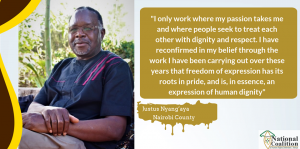

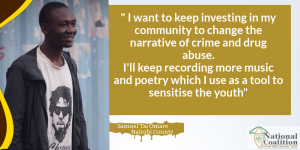
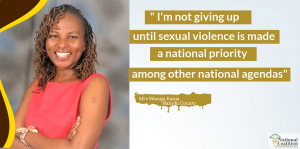
Justice and Peace Netherlands is launching a new call for human rights defenders at risk to participate in the Shelter City initiative around March 2019. The deadline to apply is 30 November 2018.
Shelter City offers human rights defenders (HRDs) at risk a possibility for rest and respite by letting them escape temporarily from a threatening situation. The initiative can benefit human rights defenders that are threatened or under intense pressure due to their work. Shelter City is an initiative coordinated by Justice and Peace Netherlands together with municipalities in the Netherlands, local partners, and the Dutch Ministry of Foreign Affairs.
How does Shelter City work?
Through temporary relocation, human rights defenders will be offered a shelter for 3 months in one of the Shelter Cities in the Netherlands, during which they can rest, continue their work in safety, build up capacity (including a one-week compulsory training on security), extend their network and raise awareness about the situation in their country. Activities can include meetings with NGOs and public authorities, public lectures, rest or leisure, treatment for work-related problems, continuing working on human rights in their country, raising awareness of human rights among the Dutch public or participating in local initiatives organised by the municipality and/or the host organisation. At the end of the programme, participants are expected to return with new tools and energy to carry out their work at home. A monthly stipend, accommodation, health insurance, visa and return flight tickets to The Netherlands are provided.
Who can apply for Shelter City?
For the purposes of Shelter City, the term HRD is intended to refer to the broad range of activists, journalists, scholars, writers, artists, political figures, lawyers, civil rights defenders, independent media professionals, civil society members, and others working to advance human rights and democracy peacefully around the world.
Applicants must fulfill the following conditions:
In order to be eligible to the Shelter City programme, HRDs must meet the following conditions:
*By conversational English we mean that participants’ level of English allows them to actively participate in a training, speak about their work, communicate with the host city, etc.
Note that additional factors will be taken into consideration in the final round of selection, such as the added value of a stay in The Netherlands as well as gender, geographic, and thematic balance. Please note that we can only accept HRDs currently residing in a third country under exceptional circumstances.
To apply or submit the application of a human rights defender, please fill in the form by clicking ‘Apply Now’ below. Application forms must be completed by 30 November 2018, at 23:59 CET (Central European Time). An independent commission will select the participants.
Apply Now for Shelter City 2019
Note that the selected human rights defenders will not be automatically allowed into the Shelter City programme as Justice and Peace is not in control of issuing the required visas to enter the Netherlands.
For more information, please contact: sheltercity@justiceandpeace.nl.
Justice and Peace Netherlands is launching a new call for human rights defenders at risk to participate in the Shelter City initiative around March 2019. The deadline to apply is 30 November 2018.
Shelter City offers human rights defenders (HRDs) at risk a possibility for rest and respite by letting them escape temporarily from a threatening situation. The initiative can benefit human rights defenders that are threatened or under intense pressure due to their work. Shelter City is an initiative coordinated by Justice and Peace Netherlands together with municipalities in the Netherlands, local partners, and the Dutch Ministry of Foreign Affairs.
How does Shelter City work?
Through temporary relocation, human rights defenders will be offered a shelter for 3 months in one of the Shelter Cities in the Netherlands, during which they can rest, continue their work in safety, build up capacity (including a one-week compulsory training on security), extend their network and raise awareness about the situation in their country. Activities can include meetings with NGOs and public authorities, public lectures, rest or leisure, treatment for work-related problems, continuing working on human rights in their country, raising awareness of human rights among the Dutch public or participating in local initiatives organised by the municipality and/or the host organisation. At the end of the programme, participants are expected to return with new tools and energy to carry out their work at home. A monthly stipend, accommodation, health insurance, visa and return flight tickets to The Netherlands are provided.
Who can apply for Shelter City?
For the purposes of Shelter City, the term HRD is intended to refer to the broad range of activists, journalists, scholars, writers, artists, political figures, lawyers, civil rights defenders, independent media professionals, civil society members, and others working to advance human rights and democracy peacefully around the world.
Applicants must fulfill the following conditions:
In order to be eligible to the Shelter City programme, HRDs must meet the following conditions:
*By conversational English we mean that participants’ level of English allows them to actively participate in a training, speak about their work, communicate with the host city, etc.
Note that additional factors will be taken into consideration in the final round of selection, such as the added value of a stay in The Netherlands as well as gender, geographic, and thematic balance. Please note that we can only accept HRDs currently residing in a third country under exceptional circumstances.
To apply or submit the application of a human rights defender, please fill in the form by clicking ‘Apply Now’ below. Application forms must be completed by 30 November 2018, at 23:59 CET (Central European Time). An independent commission will select the participants.
Apply Now for Shelter City 2019
Note that the selected human rights defenders will not be automatically allowed into the Shelter City programme as Justice and Peace is not in control of issuing the required visas to enter the Netherlands.
For more information, please contact: sheltercity@justiceandpeace.nl.
63rd Ordinary Session of the Africa Commission on Human and Peoples’ Rights
Banjul, Gambia
Public Session; Human Rights Situation in Africa
25th October 2018
Statement by NATIONAL COALITION OF HUMAN RIGHTS DEFENDERS KENYA (NCHRD-K)
Madame Chairperson, distinguished Commissioners, State Delegates, representatives of NHRIs and NGOs.
On behalf of the National Coalition of Human Rights Defenders -Kenya (NCHRD-K), I would like to thank the Commission for this opportunity to raise some of the key human rights concerns from Kenya.
We are particularly concerned that the legitimate role of protection and promotion of human rights carried on by human rights defenders and Civil Society Organizations is criminalized and target for reprisal by both state and non-state actors. Below are a few incidences of violation of human rights fundamental freedoms of human rights defenders in Kenya:
Freedom of Association: Kenyan police have continued to harass and threaten HRDs that demand justice for victims and advocate for accountability for serious injuries, death and destruction of property by security agents following unrest that took place post 2017 general elections. Most of the incidents reported by HRDs include threats of arrest, warnings against posting information about police brutality, home and office raids, and confiscation of laptops and other items. The National Coalition of Human Rights Defenders documented up to 15 cases where activists suffered these intimidation tactics.[1]The protection of HRDs should be adhered to as prescribed by law.
Freedom of Expression: On 29 May 2018, The High Court in Nairobi temporarily suspended 26 sections of the Computer Misuse and Cybercrimes Bill, which was signed into law by the President on 16 May 2018, after an appeal by the Bloggers Association of Kenya, among others.[2] While the objective of the law was to address issues including cybercrime, cyber bullying, phishing, and fake news, the law contains provisions which threaten the freedom of expression, right to privacy, the right to a fair trial. On 3 July, the suspension of the 26 provisions was extended when the Court will hear an application by the Attorney General to have the suspension lifted on the basis that it was erroneously issued.
On 31 July, during a parliamentary session, two journalists with the privately-owned People Daily newspaper were threatened with being barred from covering future parliamentary proceedings and summoned to a legislative committee. The summons was allegedly in connection to stories published on 30-31 July accusing MPs of taking and soliciting bribes from organizations and individuals they were meant to be investigating.[3]Such threats and intimidation tactics affect on the freedom of journalists to carry out their legitimate work.
Freedom of Information: In October 2018, the Kenya government introduced a 15% excise duty tax on internet services through a new Finance bill, effected on 15th October. The Bill restricts Kenyans’ access to internet services which plays a major role in promoting access to information.
Freedom of Peaceful Assembly: Police arrested two environmental activists on 25 May 2018 during a protest against plans to set up a coal-fired power plant at Kwasasi, Lamu County. The group had sought permission to peacefully assemble and demonstrate but their request was rejected by police who deemed the protest “unlawful.”[4]
The fact that the individuals were arrested while peacefully protesting raises concerns regarding the Kenyan government’s respect for the constitution, Article 11 of the African Charter of Human and Peoples Rights and international law standards that safeguards the right to peacefully assemble.
In light of these updates and observations, we urge the African Commission on Human and Peoples’ Rights to:
I thank You
ENGAGING MEDIA PRACTITIONERS IN ADDRESSING TORTURE, VIOLENCE AND DISCRIMINATION AND HUMAN RIGHTS IN KENYA
About Us
The Independent Medico-Legal Unit (IMLU) is a governance, health and human rights non-profit organization, whose vision is A Just World Free from Torture. Our work is underpinned by a holistic approach involving litigation, medical and psychosocial rehabilitation of survivors of torture, monitoring government adherence to its human rights obligations and advocacy for policy, legal and institutional reforms. Over the last 25 years, we have assisted over 5,000 victims of torture, cruel, degrading and inhuman treatment through the support of our national networks of professionals: doctors, trauma counselors, lawyers, human rights monitors and journalists. IMLU came into being way back in 1992, was registered as a trust in 1995 and subsequently as a non-governmental organization in 2003. Our programs are designed and aligned to our vision of a world free from torture, violence and discrimination, which we work towards realizing, through our continued work in promoting and safeguarding the rights of all against torture and ill treatment, by holding the state accountable.
Media and Human Rights
The role of media in protection of human rights and promotion of access to justice cannot be ignored nor minimized. Media is communicator of the public. The media has become interested not only in reporting violations of human rights, but in the institutional apparatus that has been designed to promote and protect the rights of all. Today, its role extends not only to giving facts as news, it also analyses and comments on the facts and thus shapes the views of the people. The positive impact of media on society towards this end is, today, beyond doubt and debate. The media has been setting for the nation its social, political, economic, human rights and even cultural agenda.
IMLU recognizes the important role played by reporters, columnists, correspondents, editors and other media practitioners who work to sensitize the public on human rights and thus putting the issues of access to justice on the radar of public debate in the country.
Our Engagement with the Media
Over the years we have strived to enhance our strategic engagements with media practitioners. As part of our strategy to strengthen our networks, we intend to hold a two-day training forum tentatively scheduled for 10th to 12th October 2018, with the main objective of sensitizing media practitioners on effective reporting on torture, violence and discrimination and related human rights violations. Through this sensitization forum we seek to increase the number of our network journalists and media practitioners who have resolved to join our quest for ‘A World Free from Torture, Violence and Discrimination’.
Who is Eligible?
We are looking for journalists and media practitioners who:
If you are interested in being part of this engagement, please send us your CV, a 300-word brief on your interest to participate in this very important initiative, and commitment to work with IMLU after the training, by close of business Wednesday, 3rd October 2018 to sbiko@imlu.org and a copy to ctunnen@imlu.org with the subject as ‘IMLU JOURNALSTS NETWORK FORUM’. We look forward to working with you towards ‘A just World free From Torture, Violence and Discrimination’
For additional information please contact us via phone number +254 724 256 800 or +254 712 876 573.
Nairobi, 17 September 2018
Preliminary findings of Country Visit to Kenya by the United Nations Independent Expert on the enjoyment of human rights by persons with albinism 7 to 17 September 2018
At the invitation of the Government of Kenya, I conducted an official visit in the country from the 7th to 17th of September 2018. First, I wish to sincerely thank the Government of Kenya for its openness and good cooperation in ensuring that the visit was most fruitful. I am also grateful to the United Nations, in particular the Office of the High Commissioner for Human Rights in Kenya for facilitating all aspects of my visit.
During my visit, I travelled to the cities of Nairobi, Thika, Embu, Eldoret, Kisumu and Migori. The following comments represent my preliminary findings following consultations with a wide variety of stakeholders including members of the Executive, Judiciary, Legislature, Health service providers, the Kenyan National Human Rights Commission, Gender and Equality Commission, civil society, persons with albinism themselves including victims of attacks and their families, the United Nations Country Team and Development Partners.
Overall
I wish to deeply congratulate the government of Kenya for the specific and concrete measures it has undertaken to improve the situation of persons with albinism and their enjoyment of human rights. All measures taken to-date particularly the entrenchment of an annual substantial budget dedicated specifically to persons with albinism indicate that the government had – even before the global adoption of Agenda 2030 – “set out to leave no one behind, starting with the furthest behind first”. This approach has been indispensable to the ongoing process of bringing persons with albinism from the margins into the centre, to stand as empowered constituents of the disability movement and to begin to access their rights in all areas such as health, education and above all, to life and security of person. That said, there are gaps that need to be closed, efforts that need to be consolidated, and more steps to be taken, for Kenya to fully take its place as a deserving champion on this issue in particular, as well as a leader in the area of effective strategies for leaving no one behind.
Attacks and Security of Person
As this mandate was created in context of alarming witchcraft-related physical attacks against persons with albinism in the region, it is fitting that I begin with observations concerning the right to life and security of persons with albinism. In total there are 14 reported cases of such attacks in Kenya from civil society. These include murder, mutilation, kidnapping, attempted kidnapping, and trafficking of persons and body parts. These are reported cases alone. It is important to note that no single organization in Kenya is dedicated to or focuses on monitoring and reporting attacks in a systematic way. A preliminary field research conducted this year revealed that e persons with albinism in many parts of Kenya, particularly in the border areas such as Migori and Taita Taveta counties still live in fear of attack particularly during the elections of Kenya and those of neighboring countries. Given the minority status, quantitatively-speaking, of persons with albinism, an attack on one is a significant threat to all. Accordingly, many persons with albinism in Kenya take protection measures on their own initiative including maintaining around-the-clock watch over their children. Some take their children everywhere with them while others have quit or altered their job and career paths to dedicate more time to protecting their child.
Given the regional patterns of these attacks, which – from the hundreds of cases reported to date – indicate that family members and close friends are often involved, including in some cases reported in Kenya, it is important that a situational analysis be conducted to amass evidence of a wider scope to ascertain the real state of affairs concerning security issues faced by persons with albinism.
Access to Justice
Persons with albinism in general need improved access to legal protection and remedies. I welcome reports of care shown by police in certain instances and the creation of a hotline by the National Council on Persons with Disabilities. However, these measures need to be widely publicized in addition to the work of other existing mechanisms supporting and protecting the rights of peoples with albinism such as the Kenyan National Human Rights Commission and their branch offices and partners. Moreover, victims of attacks and violations as well as their families are in need of support in rebuilding their lives and restoring their dignity including the provision of legal, medical and socio-economic assistance. Perpetrators of violations against persons with albinism also need to be systematically brought to justice. Indicators of access to justice properly implemented should include not only victim support but also proper remedies including holding those responsible accountable for their acts. Efforts should also be made to raise awareness about existing mechanisms for remediation and their respective locations.
Right to Education
I visited several students with albinism from different districts, in order to assess the situation for persons with albinism enrolled in private and public schools in Kenya.
I noticed that children with albinism are usually enrolled in special schools, such as schools for the blind, even in cases where they are not legally blind. At these schools, some of them are taught braille and are therefore not enhancing the use of their total or residual vision. That said, many persons with albinism still prefer to attend these schools for various reasons from security to acceptance as well as understanding from teachers and students alike. These are elements which are – for the most part – not present in the mainstream schools even though Kenya has adopted an inclusive education policy.
Furthermore, I learned that there is no tuition fee for primary schools in Kenya. While there are no tuition fees per se at these schools, there is a boarding fee at special schools, amounting to 26.000 Kenyan Shillings (260 US Dollars) per year. According to several of my interlocutors, an overwhelming majority of persons with albinism are poor or extremely poor and therefore unable to attend these schools. Although there is a Cash Transfer Program for financially supporting persons with severe disability who are financially challenged, the program is generally not applied to persons with albinism even though the criteria for qualifying is open and includes persons with disabilities who report living in danger. Without the requisite support, many with albinism are forced to go to mainstream schools where there is no reasonable accommodation and sometimes (severe) bullying occurs.
In both public special schools and even in a well-funded private integrated school, I noticed that students with albinism did not have all the necessary assistive devices, particularly monocular, which are indispensable for achieving quality education for persons with albinism in primary and secondary schools.
Unfortunately, without reasonable accommodation and sometimes lack of understanding from the teachers, students tend to drop out from both public and private schools. The effect being low education levels, which usually results in the absence of the necessary social or economic tools to live productive lives. This in turn leads the majority of persons with albinism into outdoor jobs that expose them to the sun and subsequently a higher risk of skin cancer. Data from neighboring countries show that skin cancer is the number one killer of persons with albinism with reports indicating that only 2 percent live beyond age 40.
With simple and concrete measures, such as a provision of monocular which I understand are already available in the country, low vision materials, extra time on tests and exams, specialized teachers and the proper support, including financial support to the students with albinism, they can break out of the vicious cycle.
Discrimination
Discrimination and stigma against persons with albinism is still prevalent in Kenya although it varies from city to city. When persons with albinism walk in the streets, it is common to hear people call out to them: “millions” or “pesa” meaning money. The normalization of these names creates a context of insecurity for persons with albinism including by confirming the misbelief that their body parts can generate wealth. It also indicates that there is a dearth in understanding around the condition of albinism itself.
Many of my interlocutors also reported bullying in job-recruitment processes owing to the colouring and appearance of persons with albinism, even before the potential employer is aware that the person with albinism also has vision impairment.
That said, several persons with albinism indicated that in their subjective assessment, discrimination and stigmatization against persons with albinism in the country has begun to decline – but only slowly. The decline was largely attributed to the presence of high-level officials with albinism including the Senator and the Judge of the high-court. Such affirmative action should be increased given their effectiveness in changing mindsets. However, to further speed up the change in mindset at the rural and border areas, the strategy of sensitization has to include mass sensitization efforts at the grassroots for a – based on best practices – minimum period of two years. Such sensitization should be wide in scope, continuous and not ad hoc; they should also target particular sectors such as education and health and should use both Kiswahili and local languages and involve persons with albinism themselves.
Right to Health
I was pleased to learn that the Government, through its Albinism Programme, housed at the National Council for Persons with Disabilities (NCPWD), has launched a special program to provide free sunscreen, after-sun products and sun protective lip balm (“prevention kits”) to all persons with albinism in Kenya. For this and other related programs, I was informed that the Government has allocated 100 million Kenyan Shillings (1 million US dollars) each fiscal year. This programme is of immense importance for preventing skin cancer.
The prevention kits are distributed in 190 hospitals in Kenya, and offered to persons with albinism free of charge. Unfortunately, I also heard of cases where persons with albinism had been denied the prevention kits because they did not have health insurance which some cannot afford. Moreover, there are inconsistencies in distribution such that some hospitals or health workers distribute the prevention kits without proof of health insurance while others do not. I welcome the NCPWD’s commitment to audit and refine this process to ensure accessibility and availability of this essential health product to all persons with albinism in all regions of the country.
Although sunscreen is an essential health product, it is not listed as an essential drug, which could make it available in areas outside of the districts and result in a lower tax on imports. In addition to listing it as an essential drug, I also strongly encourage Kenya to start producing sunscreen locally. The modalities of doing so in the region exist and this venture promises to further refine this portion of the albinism program and serve as another avenue for employment.
For some people, especially those living outside of Nairobi, access to free sun care can become a financial challenge, as they will sometimes have to travel far to receive it. In addition, I was informed that the hospitals often run out of the prevention kits which adds to the logistical difficulties and the financial burden for those who travel in vain. In the districts where there is an active civil society, such as in Embu district, a group of people take it upon themselves to inform those who live in remote areas when the hospitals run out
There are around 30 clinics for persons with albinism in Kenya. I have met some truly dedicated health care providers, who informed me that they offer counselling, proper skin care and if necessary refer them to other hospitals that are better equipped. However, both the health care providers and the clients recognised a need for more special training for health providers in order to provide better service for persons with albinism. It was also evident that wide-spread advertisement is needed to make persons with albinism all over the country aware of this health service. It was made very clear to me that many people, mainly those living outside of Nairobi, had never heard of the sunscreen program, or the clinics.
I welcome the Government’s approach to introduce Universal Health Care. It is my understanding that persons with disabilities including persons with albinism are part of the process of developing this framework. I look forward to learning more about this and to what extent it affirms and builds up the existing Albinism Programme
Data Collection
I welcome the inclusion of the indicium on albinism in the Washington Group Set of Questions to be used in the 2019 Household and Population Census. Such information is crucial to improving and fine-tuning the Albinism Programme. That said, the highest standards of data protection should be applied in context of ongoing security concerns in certain parts of the country. Data from the census should also lead to a situational survey of the particularities of this group of people so that existing measures can reach those who have been left behind.
Recommendations
Summary recommendations are listed as follows with a comprehensive list to be provided in the official report of my visit to Kenya which will be presented at the UN human rights council in March 2019.
It is generally recommended that Kenya
Intolerance towards LGBTI individuals and organisations is exacerbated by laws which make same sex activity illegal. This creates an unsafe environment for LGBTI individuals to live openly in regard to their sexual identity and orientation, and hinders their access to health, safety and other public services. Despite Kenya being one of the more progressive countries in East Africa regarding LGBQ awareness and rights, the nation still prohibits LGBQ persons. From 2010 to 2014, Kenya prosecuted 595 people for their sexuality, and LGBTI organization, based in Nairobi, have been working to reverse strict laws prohibiting gay relationships.
[1] More so, Intersex Transgender and Gender Non-Conforming (ITGNC) HRDs together with their constituents face a number of challenges and issues in their work. Their work is never safe even where they have to set up an office due to fear of victimization by either the landlord or the community around. Security is not guaranteed when they are training their members especially now that they have to do it in their offices. The sensation about it all turns to be a security threat to them. They have to be mindful of socialization issues and places.
With this in mind, Defenders Coalition felt the need to conduct an extensive security needs mapping on ITGNC HRDs while sensitizing them as well on the Safety and Protection guide in order to enable them have a wider reach into the community.
It is for these and other reasons that the Coalition convened one-day dialogues with ITGNC HRDs in Mombasa, Kisumu, Nakuru and Nairobi to better understand the security concerns they face in the course of their human rights work and strategies in place to mitigate against those concerns for the purposes of developing a security guide and training manual for the ITGNC community.
OBJECTIVE
To carry out a needs assessment security mapping amongst ITGNC HRDs from Nairobi, Nyanza, Rift Valley, Western and Coast regions in order to better understand the security concerns they face in the course of their human rights work and strategies in place to mitigate against those concerns.
OUTCOMES
Identification of safety and protection measures amongst ITGNC HRDs working on SOGIE issues.
Developed sustainable safety and protection measures informed by ITGNC HRDS security needs to ensure the safe conduct of their human rights work.
In a democracy, the authority of the government derives solely from the consent of the governed and is realised by holding free and fair elections. But from 1969, Kenya was a de facto one-party state and in June 1982, the National Assembly of Kenya passed Article 2A of the Constitution of Kenya, officially declaring Kenya a de jure one-party state. This saw the consolidation of power within the ruling party, and opposition leaders and citizens at large were unable to speak freely, assemble, or move around the country to offer alternative voices, speak their criticisms of the government openly and bring alternative policies and candidates to voters. State-sponsored repression that included arbitrary arrests, detention without trial, prolonged trials arising from trumped-up charges, torture and other human rights violations were meted out on citizens, the academic community, journalists and politicians who expressed dissenting opinions or were perceived to be doing so by state agents.
Between 1982 and 1992, political leaders and human rights defenders (HRDs) in Kenya came together, amid serious repression, to champion multi-partyism, demanding democratic elections that would meet the threshold of being competitive, periodic, inclusive and definitive, and would thus give power back to citizens who would enjoy broad freedom to criticise the government, publish their criticisms and present alternative views. These efforts were met with resistance and those at the forefront experienced arbitrary arrest, incommunicado detention, enforced disappearance, threats and harassment.
The efforts of the reformers, as they were popularly known, won the support of foreign missions, primarily from western states, and bilateral and multilateral donors, which demanded that the Kenyan government should embrace democracy with all its tenets of good governance, accountability and transparency as well as respect for human rights as a condition for aid. Faced with protests, boycotts and international pressure, the government caved in, albeit reluctantly, to the demands for political pluralism, which was restored in 1992 with the repeal of Article 2A.
It should be recalled that the repeal of Article 2A to allow for multiparty politics was not complemented by other legal and institutional reforms to enable a thriving democracy. This was compounded by state efforts to scuttle the conduct of free and fair elections by persistent state-orchestrated inter-ethnic hatred that translated into political and ethnic clashes that took place in 1992 and in every election period since the introduction of multiparty democracy in Kenya.
The climax of simmering ethnic tensions was the eruption of violence following the 2007 general elections that plunged Kenya into political, economic and humanitarian crisis. The conflict saw serious human rights violations committed in a context where over 600,000 Kenyans were internally displaced and close to 2,000 people were killed. The stalemate between rival presidential candidates Raila Odinga and Mwai Kibaki was resolved in February 2008 following the negotiation and signing of the National Peace Accord and the subsequent enactment of the National Peace Accord and Reconciliation Act. Among the agenda items this laid out was the need for a new constitution, which was drafted and promulgated after a referendum in 2010.
Civil society organisations (CSOs) and HRDs in Kenya once again played a critical role in the documentation of human rights violations, championing justice for the victims and accountability for perpetrators. The documentation of human rights violations by HRDs was particularly critical in laying the foundation for the investigation of the 2007 election violations by the International Criminal Court (ICC) and subsequent prosecution of six individuals believed to have been most responsible. The role of CSOs and HRDs in documenting violations has ever since put them in the crosshairs of the political elite, who have targeted individual HRDs with threats, harassment and intimidation, and have aimed negative rhetoric at CSOs with the aim of denting their credibility in society. There is also an attack on the media and journalists, despite the constitutional protection of media freedom and media independence.
The Faculty of Advocates is pleased to announce the launch of the Scottish Bar International Human Rights Award.
The award seeks to recognise the achievements of human rights defenders who work in challenging situations around the world.It is open to human rights lawyers and defenders who are not residents of the UK or Ireland.
The winner of the award will be invited to Scotland to share the experience of their work. The Faculty of Advocates will offer training to help build capacity. We will arrange meetings and contacts with human rights organisations and others to offer solidarity and build support for the future.
More information on the award, the criteria and the application process is available here:
https://www.humanrights.scot/awards/scottish-bar-international-human-rights-award-2018/
According to the United Nations, “There is no strict definition of human rights defenders because they can be anyone who acts at any moment for any human rights. A human rights defender can be a man, a woman, a lawyer, a student, an NGO’s employee, a doctor or any person from any profession, of all ages, nationalities, religions, etc. A person can also be considered as a human rights defender whether she promotes and protects human rights her whole life, occasionally, or only once”. Amnesty International explains that human rights defenders can be “teachers, students, political opponents, factory workers, journalists, lawyers, or so many others”. If you defend human rights through peaceful means, you are a human rights defender!
We are collecting these recordings because the world needs to know about the work of people like YOU who defend rights. (Please record your story using a computer and not a phone or tablet
These stories will be used to strengthen a positive narrative about human rights defenders that more accurately conveys how important this work is.
Tips for telling a great story
To begin your story submission, click on the “Tell Your Story” button to create an account to log in onmemria.org. Once you sign in, you will see the story request “Tell Your Story” button. Click this button, upload a photo, then begin recording your responses to three questions:
You can also add your own custom section if you would like to tell us more about your story. Please make sure to click “Submit” to submit your story when you are done recording your response.
Your input would be absolutely invaluable to the success of this project, so we greatly appreciate the time you take to submit your story and to pass this along to your networks and colleagues. We also have links to our website in Spanish and French.